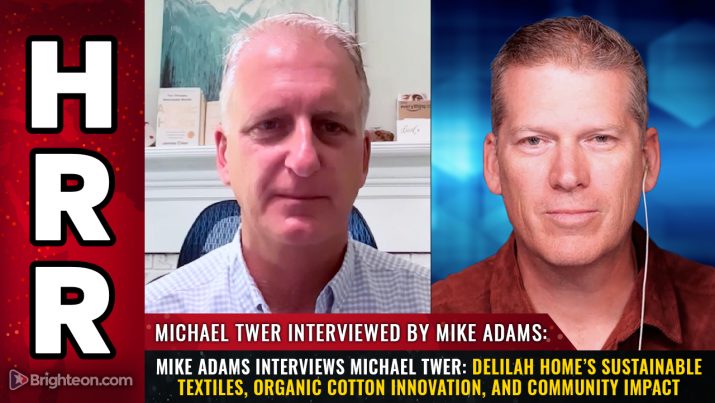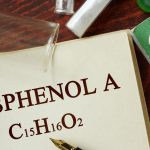
Organic textiles revolution: How Delilah Home is fighting toxic chemicals in everyday fabrics
Thursday, August 28, 2025 by Finn Heartley
http://www.products.news/2025-08-28-delilah-home-fighting-toxic-chemicals-in-everyday-fabrics.html

- Conventional cotton is toxic—Nearly 40% of global herbicide/pesticide use comes from cotton farming, leaving residues like glyphosate and formaldehyde in fabrics, linked to cancer and endocrine disruption.
- Organic cotton is safer—GOTS-certified cotton (like Delilah Home’s) ensures chemical-free farming, no toxic dyes, ethical labor, and durable fibers that soften naturally without synthetic treatments.
- Skin absorbs toxins—Textiles touch your largest organ; conventional fabrics expose you to flame retardants, synthetic dyes, and pesticides, while organic cotton protects health and the environment.
- Beware laundry products—Even organic fabrics can be contaminated by toxic detergents (e.g., Tide); switch to baking soda, fragrance-free detergents, or essential oil dryer balls.
- Avoid greenwashing—Many brands falsely claim sustainability; trust only GOTS-certified textiles and innovations like DryTech (recycled plastic fabrics) for truly clean, ethical products.
The Hidden Dangers of Conventional Cotton—And the Clean Alternative
Most people don’t realize that the soft towels, cozy bedsheets, and comfortable clothing they use daily could be exposing them to toxic chemicals. Conventional cotton production accounts for nearly 40% of global herbicide and pesticide use, contaminating not just the environment but also the fabrics that touch our skin.
Michael Twer, CEO of Delilah Home, is on a mission to change that. His company produces GOTS-certified organic cotton textiles, ensuring that from seed to shelf, zero harmful chemicals ever touch their products—while also enforcing child labor-free production.
The Toxic Truth About Conventional Textiles
Most consumers assume that textiles—towels, sheets, and clothing—are harmless. But the reality is far darker:
- Pesticide & Herbicide Residues: Conventional cotton farming relies on glyphosate, organophosphates, and other toxic chemicals, which can linger in fabrics even after processing.
- Hidden Processing Chemicals: Even after harvesting, conventional textiles undergo treatments with formaldehyde, synthetic dyes, and flame retardants, many of which are linked to cancer and endocrine disruption.
- Environmental Destruction: Cotton farming devastates ecosystems, depleting soil nutrients and contaminating water supplies.
“Your skin is your largest organ,” says Twer. “What touches your skin is almost as important as what you put in your body.”
Delilah Home’s Solution: GOTS-Certified Organic Cotton
Delilah Home’s textiles meet the Global Organic Textile Standard (GOTS), the gold standard for organic fabrics. This certification ensures:
? Non-GMO seeds
? Chemical-free farming
? No toxic dyes or finishes
? Ethical labor practices (no child labor)
Their cotton is sourced from Turkey and India, then manufactured in Portugal, where factories adhere to Europe’s strict environmental regulations.
Why Organic Cotton Feels Different
Unlike conventional cotton, which can degrade quickly due to chemical treatments, organic cotton fibers remain strong and soft over time.
“Our towels and sheets get softer with every wash because there are no synthetic chemicals weakening the fibers,” explains Twer.
A Warning About Laundry Detergents
Even the cleanest organic textiles can be ruined—and your health compromised—by toxic detergents like Tide, which contain fragrance chemicals, surfactants, and endocrine disruptors.
Twer recommends:
? Baking soda (a natural cleanser)
? Essential oil-infused dryer balls (instead of synthetic fabric softeners)
? Fragrance-free, non-toxic detergents
Beyond Cotton: Sustainable Innovations
Delilah Home also pioneers DryTech, a fabric made from recycled plastic bottles—diverting waste from landfills while creating durable, antimicrobial textiles perfect for beach towels, pet towels, and activewear.
The Future of Clean Textiles
As consumers become more aware of toxic exposure, demand for organic, ethically made textiles is rising. But Twer warns: Beware of “greenwashing.” Many brands falsely claim sustainability while still using harmful chemicals.
The solution? Look for GOTS certification and support companies like Delilah Home that prioritize clean living from farm to fabric.
Watch the full episode of the “Health Ranger Report” with Mike Adams, the Health Ranger, and Michael Twer as they talk about Delilah Home’s Sustainable Textiles, Organic Cotton Innovation, and Community Impact.
This video is from the Health Ranger Report channel on Brighteon.com.
More related stories:
The raw material for various natural textiles shown to have potent antioxidant properties
Why sleep is just as important as diet and exercise
Sources include:
Tagged Under: Tags: badpollution, chemicals, child labor safety, community impact, consumer awareness, Delilah Home, dry tech towels, environ, environmental standards, GOTS certification, low reactive dyes, non-GMO seed, organic cotton, organic textiles, poisons, quality over quantity, recycled materials, sustainable home products, toxins, zero harmful chemicals
RECENT ARTICLES


Ron Paul warns: Government ownership of corporations signals rising fascism in America

Organic textiles revolution: How Delilah Home is fighting toxic chemicals in everyday fabrics

BPA-free food labels hide dangerous truth as replacements kill cells and disrupt DNA repair
By Cassie B.

Brussels-Washington trade deal grinds to halt amid clash over digital CENSORSHIP laws
By Belle Carter
COPYRIGHT © 2017 PRODUCTS NEWS


